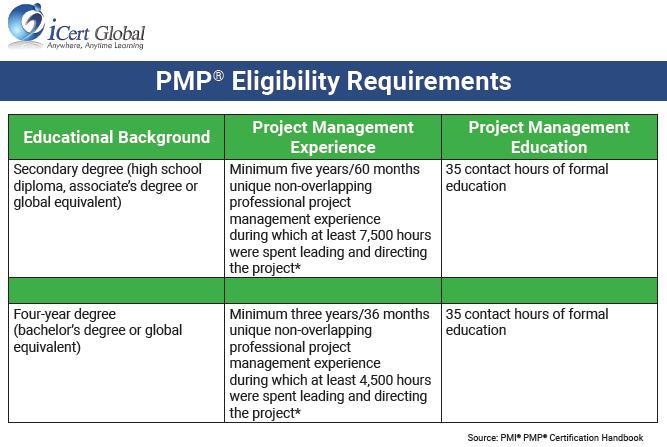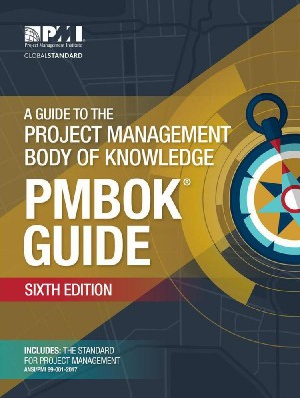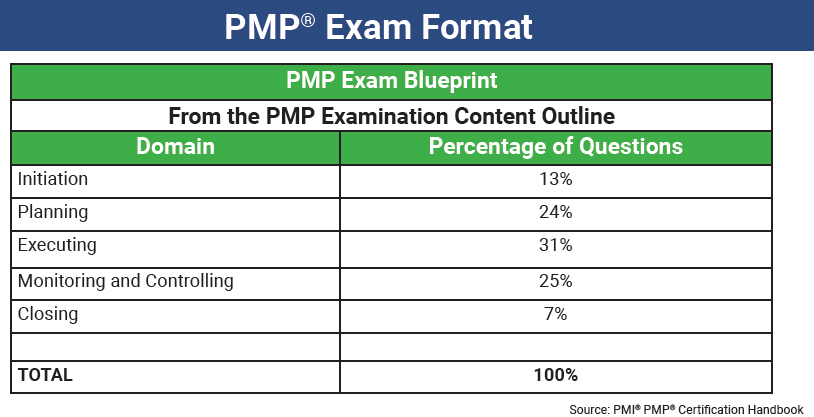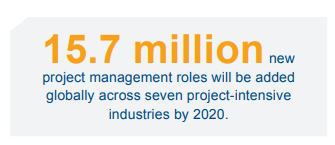.jpg)
Nine Steps to Become PMP®️ Certified Professional
PMP is one of the most prestigious certifications project managers hold. Project management professional (PMP®️) certification is a globally-recognized certification accredited by the Project Management Institute (PMI®️). Companies and organizations across the globe are looking for skilled project managers to contribute to the success of their business.
Here are the 9 steps to get PMP certification.
Step 1: Go through the PMP Handbook
Step 2: Meet the Eligibility Criteria
Step 3: Take PMP training to earn contact hours
Step 4: Know about the membership
Step 5: Signup with PMI and Fill the application
Step 6: Study PMBOK-6th edition guide
Step 7: Prepare notes and collect study- materials
Step 8: Take PMP exam simulators
Step 9: Take the exam
1. Go through the PMP handbook
PMP handbook is published by the Project Management Institute (PMI). PMP handbook from PMI has an overview of the PMP certification program. One can understand the certification process easily with the help of PMP handbook. The PMP credential handbook by PMI is available online for free. The PMP handbook contains details about:
- The PMP eligibility requirements
- Guide to complete the online application
- PMP examination details
- PMP certification fees
- PMI audit process
- PMP exam policies and procedure
- PMP credential policies and procedure

2. Meet the Eligibility Criteria
You have to fulfil the pre-requisites to clear PMP examination.

To become eligible for PMP certification, you need to satisfy the education, project experience, and project management education criteria.
- Secondary degree (high school diploma, associate’s degree or the global equivalent)
- 7,500 hours leading and directing projects
- 35 hours of project management education
OR
- Four-year degree
- 4,500 hours leading and directing projects
- 35 hours of project management education
3. Take PMP training to earn contact hours
35 hours of project management training education is required to fulfil the eligibility criteria to take up a prestigious certification exam in project management. The PMP Candidates should make sure that training consists of the following project management knowledge areas:
- Project Quality
- Project Scope
- Project Schedule
- Project Budget
- Project Communications
- Project Risk
- Project Procurement
- Project Integration Management.
The candidates should make sure that the following mode of education does not count as contact hours
- PMI Chapter meeting with no learning activity.
- Self-study
- Management degree or post-graduation in management which cannot be mapped in project management knowledge areas mentioned above.
To get the 35PDUs, you can enrol in PMP® workshops for 2 to 6 days are conducted by R.E.Ps and training companies around the world. You will learn, engage, participate and gain knowledge in these 4 days of intensive training programs conducted by professionals who are experts in their domains. These sessions are very interactive with instructors and fellow participants that instils confidence and gets you ready to take up the challenge in the form of PMP® certification exam.
4. Know about the membership
The PMI serves more than 2.9 million professionals including over 500,000 members in 208 countries and territories around the world, with 300 chapters and 10,000 volunteers serving local members in over 80 countries.
Though it is not mandatory to take PMI membership for PMP certification it is recommended for a discount on exam fee, opportunity to join local PMI chapter, free access to PMBOK guide etc.
If you are a member of PMI, PMI arranges frequent meetings, global conferences for members across the globe and speak a common language of project management.
You can also access to online communities, templates, member-only webinars, virtual events etc. It will help you to build your network.
5. Sign up with PMI and fill the application
- Go to http://www.pmi.org/ and click on “Login / Register” at the top-right corner and create an account.
- Wait for the follow-up mail from PMI, confirm your registration and login to your account.
- Fill the application according to the procedure given in PMP handbook
Refer our blogs for detail procedure
- Step by Step procedure to fill the PMP application form
- How to fill Project management experience in PMP application form
6. Study PMBOK-6th Edition Guide
A Guide to the Project Management Body of Knowledge (PMBOK® Guide) is PMI's flagship publication and is a fundamental resource for effective project management in any industry.

The PMBOK® Guide is your principal book. So study and master it. It is the key source but not the only source. You can consider PMBOK® Guide as a primary reference.
This guide has answers to most of the questions posed in the final exams and hence be thorough. Expert opinion has it that close to 75% of PMP® exam questions are from PMBOK® Guide.
According to PMI, PMP exam is based on 5 main domains:

7. Prepare notes and collect study materials
As stated before PMBOK® guide is only the principal source. It is not the only source, so try to get study materials that you can access with regard to project management. Try to read as many as possible – the depth matters. With tons of information in the internet, you can make the most of the opportunity to your personal growth and benefit.
You need to earn PMP-stipulated 35 contacts hours or PDUs (Professional Development Unit) which cant be earned by self-study.
8. Take PMP Exam Simulators
Exam simulators are practice test papers to check the extent of your preparation. You will get to know the stronger and weaker areas to concentrate on.
The are many free resources to check your preparation level.
Download Free PMP® Exam Practice Test with 200 PMP® Questions.
Full-length PMP sample test with 200 PMP exam prep questions.
The advice given by experts is that sample papers scores should be always 90% and above. If you can get that kind of score in your practice test consistently, you will clear in the first attempt.
9. Take the exam
Now, that all is done, its time to wrap up and appear for the exam on the scheduled date and time for your PMP® certification exam.
Total Questions: 200
Pretest question: 25 (Not added to PMP score)
Type of questions: Multiple-choice questions
Duration: 4 hours (No scheduled breaks mentioned)
Note: We do not know which 25 questions are pre-test questions so all the questions are to be attempted with equal importance. Pretest questions are generally experimental in nature and given to check the validity for further examinations.
Don’t skip the short tutorial on how to use the computer and the software at the beginning of the exam to avoid a blunder.
Why do we need to get PMP certification?
PMP certification holds good value in the field of project management.
According to the statistics report by WRIKE,
“80 percent of high-performing projects are led by a certified project manager”.
There are ocean-like opportunities in the field of project management for PMP certified professional.
According to PMI’s Talent Gap: Project management through 2020,

The earning potential increases with experience and progress of knowledge. According to Earning Power: Project Management Salary Survey, 10th Edition, certified PMP professionals earn 23% higher salary on average across 37 countries surveyed.
The countries with higher increase in the median salary of certified professionals are:
|
Country |
Earning advantage |
|
South Africa |
58% |
|
Ecuador |
53% |
|
Colombia |
48% |
|
Chile |
43% |
|
Mexico |
43% |
In the United States, the median salary of Certified PMP professionals among survey respondents was 25% higher than the median salary of those without the PMP certification ($115,000 versus $92,000).
How much does it cost for PMP certification?
|
PMI® Membership fee |
$139 |
|
PMI® Membership renewal fee |
$129 per year |
|
PMP® Certification Exam fee - PMI® Membership |
$405 |
|
PMP® Certification Exam fee for non-members |
$555 |
|
PMP Renewal Fee for members |
$60 |
|
PMP Renewal Fee for members |
$150 |
|
Reexamination fee for PMI® members |
$275 |
|
Reexamination fee for non-members |
$375 |
Fixed cost
- PMI Membership Fee
- PMBOK® Guide
- PMP Certification Fee
- Rescheduling Fee
- PMP renewal fee
Variable cost.
- Training Course
- Reference/Study materials
Check our blog for cost in detail- What Is The Cost Of Pmp Certification?
What is the salary for Certified PMP professionals?
According to Earning Power: Project Management Salary Survey, 10th Edition from PMI.
- Salary Based On Employment
The salary structure for PMP varies from country to country. The countries where project management professionals report the highest median salaries
Surprisingly, its not the United States (US$112,000), that tops the chart for the highest median salary project management professionals. It is Switzerland (US$130,996). Egypt is the country with the lowest median salary(US$10,159).
- Salary based on certification status
PMP certification has to be renewed to maintain the “active” status. One of the factors to influence the salary is the certification status. The tenure of the PMP certification has its added advantage. South Africa tops the list for median salary at 58%for PMP certified professionals as compared to those without PMP credential.
- Salary Based On Position
The position with added roles and responsibilities plays a significant role in deciding the salary. The PMP professionals draw more as salary with respect to their designation. Higher the position, the higher the pay. It can be inferred from the survey that Nigeria, offers the highest in terms of the median salary for a Project Manager III (US$30,305 ), Project Manager 11 (US$20,735 ) and Project Manager I (US$13,079).
- Salary Based On Project Size
Project Managers managing larger projects and big teams are paid more. However, the variance of salary with regard to team size changes from country to country.
RECOMMENDED POST:
Key Features of PMP® Certification Training
Top 10 Reasons to Get PMP® Certified
How To Qualify PM Experience In PMP Application Form
The Step By Step Procedure To Fill The Application Form
Do visit our Corporate Training to know more about core offerings for enterprises in empowering their workforce.
Download Free PMP® Exam Practice Test with 200 PMP® Questions.
Full-length PMP sample test with 200 PMP exam prep questions.
You may also be interested in Sample PMP® Exam Prep Questions before you download the Free PMP® Practice Test.
Download our Free PMP Brochure for more information.
iCert Global conducts Project Management, Quality Management, Business Analysis, Agile, Scrum, and DevOps Certification courses across various locations in the United States.
Visit us at https://www.icertglobal.com/ for more information about our professional certification training courses or Call Now! on +1-713-287-1213 / +1-713-287-1214 or e-mail us at info {at} icertglobal {dot} com.
Project Management Training by iCert Global:
Quality Management Training by iCert Global:
- Lean Six Sigma Yellow Belt (LSSYB) Certification Training Courses
- Lean Six Sigma Green Belt (LSSGB) Certification Training Courses
- Lean Six Sigma Black Belt (LSSBB) Certification Training Courses
Scrum Training by iCert Global:
- CSM (Certified ScrumMaster) Certification Training Courses
Agile Training by iCert Global:
- PMI-ACP (Agile Certified Professional) Certification Training Courses
DevOps Training by iCert Global:
- DevOps Certification Training Courses
Business Analysis Training by iCert Global:
- ECBA (Entry Certificate in Business Analysis) Certification Training Courses
- CCBA (Certificate of Capability in Business Analysis) Certification Training Courses
- CBAP (Certified Business Analysis Professional) Certification Training Courses
The company conducts both Instructor-led Classroom training workshops and Instructor-led Live Online Training sessions for learners from across the United States and around the world.
Please Contact Us for more information about our professional certification training courses to accelerate your career in the new year. Wish you all the best for your learning initiatives in the new year.
Which certifications are you aiming to achieve in the New Year? Let us know your thoughts in the 'Comments' section below. Thank you.
Comments (0)
Write a Comment
Your email address will not be published. Required fields are marked (*)


















.webp)






.webp)
